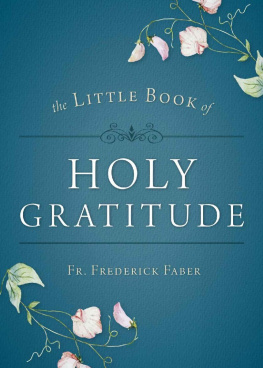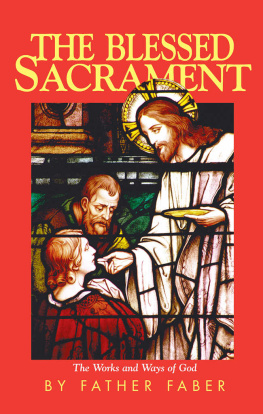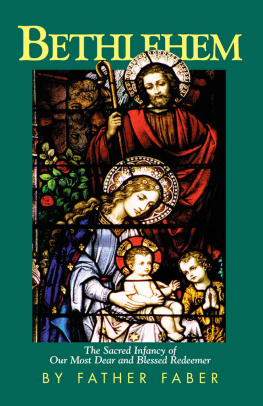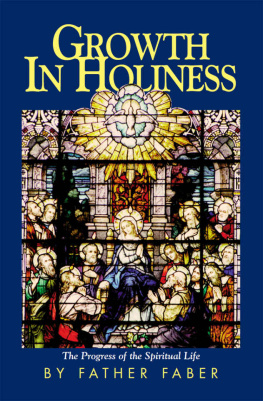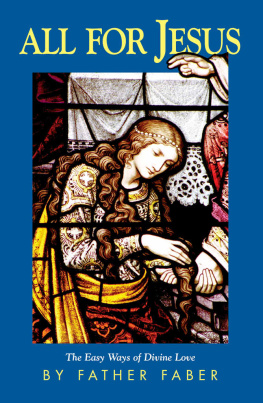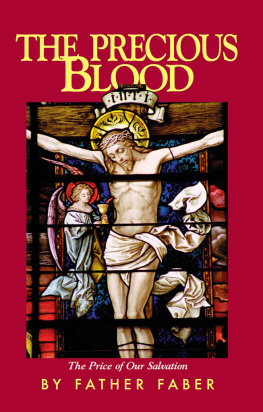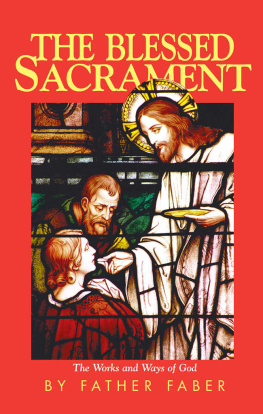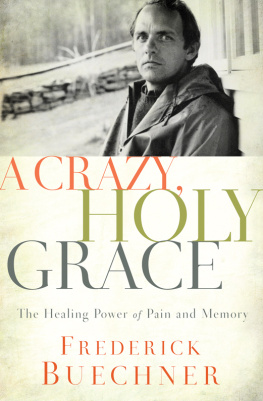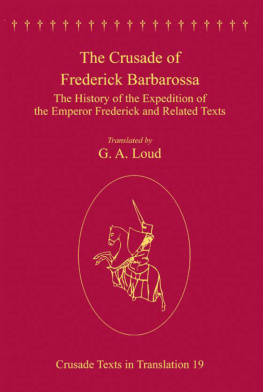Fr. Frederick Faber - The Little Book of Holy Gratitude
Here you can read online Fr. Frederick Faber - The Little Book of Holy Gratitude full text of the book (entire story) in english for free. Download pdf and epub, get meaning, cover and reviews about this ebook. year: 2016, publisher: Sophia Institute Press, genre: Science. Description of the work, (preface) as well as reviews are available. Best literature library LitArk.com created for fans of good reading and offers a wide selection of genres:
Romance novel
Science fiction
Adventure
Detective
Science
History
Home and family
Prose
Art
Politics
Computer
Non-fiction
Religion
Business
Children
Humor
Choose a favorite category and find really read worthwhile books. Enjoy immersion in the world of imagination, feel the emotions of the characters or learn something new for yourself, make an fascinating discovery.
- Book:The Little Book of Holy Gratitude
- Author:
- Publisher:Sophia Institute Press
- Genre:
- Year:2016
- Rating:3 / 5
- Favourites:Add to favourites
- Your mark:
- 60
- 1
- 2
- 3
- 4
- 5
The Little Book of Holy Gratitude: summary, description and annotation
We offer to read an annotation, description, summary or preface (depends on what the author of the book "The Little Book of Holy Gratitude" wrote himself). If you haven't found the necessary information about the book — write in the comments, we will try to find it.
The Little Book of Holy Gratitude — read online for free the complete book (whole text) full work
Below is the text of the book, divided by pages. System saving the place of the last page read, allows you to conveniently read the book "The Little Book of Holy Gratitude" online for free, without having to search again every time where you left off. Put a bookmark, and you can go to the page where you finished reading at any time.
Font size:
Interval:
Bookmark:
the L ITTLE B OOK of
HOLY
GRATITUDE
Compiled from the works of
F R. F REDERICK W ILLIAM F ABER
SOPHIA INSTITUTE PRESS
Manchester, New Hampshire
Copyright 2016 by John L. Barger
The Little Book of Holy Gratitude was originally published in 1911 by R. and T. Washbourne, London, under the title On Thanksgiving . The 2016 edition by Sophia Institute Press includes minor editorial revisions.
Printed in the United States of America. All rights reserved.
Cover and interior design by Perceptions Design Studio.
Scripture passages are taken from the Douay-Rheims edition of the Old and New Testaments. Where applicable, Scripture passages have been cross-referenced with the differing names and enumeration in the Revised Standard Version, using the following symbol: RSV =.
No part of this book may be reproduced, stored in a retrieval system, or transmitted in any form, or by any means, electronic, mechanical, photocopying, or otherwise, without the prior written permission of the publisher, except by a reviewer, who may quote brief passages in a review.
Sophia Institute Press
Box 5284, Manchester, NH 03108
1-800-888-9344
www.SophiaInstitute.com
Sophia Institute Press is a registered trademark of Sophia Institute.
Library of Congress Cataloging-in-Publication Data
Names: Faber, Frederick William, 1814-1863, author.
Title: The little book of holy gratitude / compiled from the works of Fr.
Frederick William Faber.
Description: Manchester, New Hampshire : Sophia Institute Press, 2016. |
Originally published under title: On thanksgiving : London : R. and T.
Washbourne, 1911. | Includes bibliographical references.
Identifiers: LCCN 2016015532 | ISBN 9781622823437 (pbk. : alk. paper) ePub ISBN 978-1-622823-444
Subjects: LCSH: Gratitude Religious aspects Christianity.
Classification: LCC BV4647.G8 F33 2016 | DDC 241/.4 dc23 LC record available at https://lccn.loc.gov/2016015532
C ONTENTS
Appendix:
Biographical Note:
N OTE

The following pages from Fr. Faber are, for the most part, from the seventh chapter of his most popular work, All for Jesus . The incidental words at its beginning have been omitted; but a page from The Creator and the Creature, showing how radical gratitude is in religion, has been prefixed to it, and a few pages on that virtue have been added from The Blessed Sacrament . Where possible we have provided the dates of persons mentioned by Fr. Faber and the names of the creators of the images.

T HANKFUL S OULS A RE H APPY

T he love of gratitude is preeminently a mindful love. It ponders things and lays them up in its heart, as our Blessed Lady did. It meditates fondly on the past, as Jacob did.
It sings of old mercies and makes much of them, like David in the psalms. Whereas another has the memory of his sins continually before him, a soul possessed with the love of gratitude is perpetually haunted by a remembrance of past benefits; and his abiding sorrow for sin is a sort of affectionate and self-reproachful reaction from his wonder at the abundant loving-kindness of God.
The hideousness of sin is all the more brought out when the light of Gods love is thrown so strongly on it. Hence it comes to pass that a very grateful man is also a deeply penitent man; and as the excess of benefits tends to lower us in our own esteem, so we are humble in proportion to our gratitude. But this love does not rest in the luxurious sentiment of gratitude. It breaks out into actual and ardent thanksgiving, and its thankfulness is not confined to words.
Promptitude of obedience, heroic effort, and joyful perseverance: these are all tokens of the love of gratitude.
It is loyal to God.
Loyalty is the distinguishing feature of its service. It is constantly on the lookout for opportunities and makes them when it cannot find them, to testify its allegiance to God; not as if it were doing any great thing, or as if it were laying God under any obligation, but as if it were making payment, part payment and tardy payment, by little installments, for the immensity of His love.
It is an exuberant, active, bright-faced love, very attractive and therefore apostolic, winning souls, preaching God unconsciously, and although certainly busied about many things, yet all of them the things of God.
Happy the man whose life is one long Te Deum! He will save his soul, and not his alone, but many others also. Joy is not a solitary thing, and he will come at last to his Masters feet, bringing many others rejoicing with him, the resplendent trophies of his grateful love.

G RATITUDE B RINGS M ANY B LESSINGS

G ods mercy is the great feature of the two kingdoms of nature and of grace. Gratitude is mans answer to Gods mercy; and just as charity to our neighbor is the best test of our real love of God, so gratitude to our neighbor for his kindness to us is a clearer proof of a grateful disposition than gratitude to God, which is mixed up with so many other cogent considerations.
If we realize everything as coming from God, then these benefits are from Him; and they come from Him in the most beautiful and touching way, through the mediation of our brothers human heart inspired by grace. So every kindness we receive is a little copy of the Incarnation, a miniature of that attractive mystery.
Gratitude increases humility
Gratitude is grounded in humility, and, as usual, increases the grace from which it takes its rise. Heroic humility fancies that wrong is the only right which is due to it. The least kindness seems disproportionately great to a keen and delicate sense of our own unworthiness. The wonder is that anybody should be kind to us at all. If they knew us as we know ourselves, they would have to do holy violence to themselves to show us common courtesy, as great violence as the saints did to themselves when they licked the ulcers of the lepers.
Gratitude increases charity
Again, what warms the heart more to others than the exercise of gratitude? Uncharitableness to a benefactor seems almost an impossibility. Lears daughters were monsters. Yet think how hard it is to love anyone, any single one, with real charity, without judging, without criticism, without censoriousness, extenuating the evil, believing against appearances, magnifying the good, rejoicing in his virtues.
It is much if each man has one person upon the earth to whom he really feels thus. It is an immense help to his sanctification, a real talent for which he will have account to give.
I doubt its being common, at least in its evangelical purity. Gratitude to benefactors is on the road to it, and not far distant.
Gratitude is contagious
Then again, gratitude is eloquent, graceful, and persuasive as a missionary. It is not only a virtue in ourselves, but it makes others good and virtuous also. It is a blessedly humbling thing to be loved, a veritable abasement to be affectionately respected by those about us.
Gratitude also makes our benefits to others look so little that we long to multiply and enlarge them, while it softens our hearts and unties from them all manner of little antipathies, mean jealousies, petty rivalries, and cold suspicions.
Next pageFont size:
Interval:
Bookmark:
Similar books «The Little Book of Holy Gratitude»
Look at similar books to The Little Book of Holy Gratitude. We have selected literature similar in name and meaning in the hope of providing readers with more options to find new, interesting, not yet read works.
Discussion, reviews of the book The Little Book of Holy Gratitude and just readers' own opinions. Leave your comments, write what you think about the work, its meaning or the main characters. Specify what exactly you liked and what you didn't like, and why you think so.

